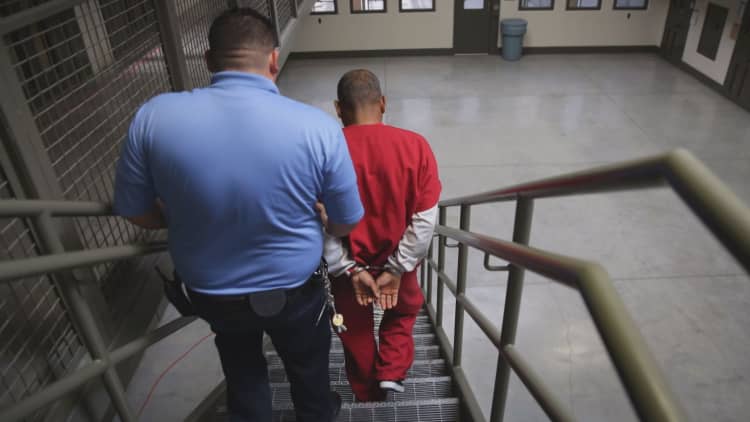The Trump administration's much-publicized increase in immigration enforcement is also increasing the bottom line for for-profit prisons and other companies from the private sector, with many signing multimillion-dollar contracts with the Department of Homeland Security.
"A lot of people imagine immigration detention as being a government-only function, but there are private contractors throughout the entire immigration enforcement and detention system," said Jeremy Mohler, communications director of the research and policy group In the Public Interest.
"From the moment after an undocumented immigrant is arrested, you have corporations that contract with federal agencies and provide everything from operating detention centers to providing ankle monitors ... all the way to chartered flights if they're deported," Mohler said.
Here's a look at the private sector businesses making money from immigration enforcement:
Tech
Running a massive nationwide government operation requires organization and technology. And a number of the industry's biggest players are offering up their services.
Just take media giant Thomson Reuters. Its Special Services subsidiary won a $6.8 million contract with U.S. Immigration and Customs Enforcement in March. According to the contract, Thomson Reuters will provide support for ICE’s Enforcement and Removal Operations unit in its mission to "locate, arrest and remove criminal aliens that pose a threat to public safety.”
And then there's Microsoft. The tech giant faced internal backlash from employees protesting the company's work with ICE in a letter originally reported by The New York Times. Though CEO Satya Nadella issued statements on President Donald Trump's family separation policy, Microsoft's $19.4 million contract with ICE still stands.
Transport
Once people are detained, there's the question of how to physically get them to a detention center. ICE uses ground transportation, charter and commercial aircraft and officer escorts to detain and deport immigrants.
ICE has its own air transportation division, ICE Air Operations, that works with the federal GSA to contract charter flight services through companies like CSI Aviation and Zephyr Aviation. Part of ICE's budget allocates funds to commercial aircraft contracts, too. However, a number of U.S. airlines, including American and United, have been quick to distance themselves from the immigration issue.
A big part of ICE's Transportation and Removal Program budget is allocated to ground transportation. One of the agency's private sector partners, GEO Transport, has more than 300 vehicles to support ICE, the U.S. Marshals Service, the Federal Bureau of Prisons and its state-level contracts. But that's not all the company does. It's actually part of a much larger, publicly traded company called GEO Group.
"Immigration policy is a key part of the story for these private prison operators, but it's not the whole story," said Alex Cynamon, director at Height Capital Markets. His team conducts research on sectors most impacted by government actions and policies.
"These businesses are more diversified than might first meet the eye."
For-profit prisons
GEO Group is involved in nearly every step of the immigration enforcement process, from prison design to electronic tracking of released immigrants. And it’s optimistic about future earnings under Trump.
In April 2017, it won the first ICE contract under the Trump administration, a $110 million 10-year deal to run a 1,000-bed detention facility in Texas. A GEO Group spokesperson said the proposal was originally made under the Obama administration in July 2015. Now that the contract is approved, the company expects it to generate $44 million in annualized revenues.
A GEO Group spokesperson said it does "not take a position on nor have we ever advocated for or against criminal justice or immigration policies."
Another one of the country's leading for-profit prison companies, CoreCivic, was awarded a $1 billion four-year contract in 2014 for a single facility in Dilley, Texas. The terms of the contract were renegotiated for a lower rate in 2016.
These examples alone don’t illustrate the full extent of private sector businesses involved in U.S. immigration enforcement. There are also bail bond companies, health care companies, food service groups, money transfer services and more working in tandem with for-profit prisons and ultimately, the U.S. government, to help run the multibillion dollar business of immigration enforcement.



